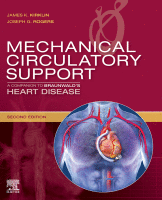Physical Address
304 North Cardinal St.
Dorchester Center, MA 02124

I. The trail blazed and the pathway ahead As the field of Mechanical Circulatory Support (MCS) reaches into its sixth decade beyond first laboratory experimentation, it behooves us to reflect on the historical, pioneering advances on which the future will…

Introduction A regulatory/reimbursement product plan should be created simultaneously, early in the product development cycle, with the concept of developing ongoing evidence to support appropriate device use. If each is treated separately and implemented linearly rather than collectively, significant market…

Origins of Intermacs/Pedimacs In The Artificial Heart: Prototypes, Policies, and Patients: Institute of Medicine Report from 1991, the committee opined that “maintaining a registry of mechanical circulatory support (MCS) recipients should be considered a routine aspect of this care.” With…

Heart failure (HF) is characterized by a pathologic process known as remodeling that involves progressive enlargement (See Chapter 9 ) of the ventricle, reduction in contractility, and an increase in intracardiac pressures. These changes are associated with adverse cellular, structural,…

Introduction Mechanical circulatory support (MCS) for pediatric patients has advanced enormously, since its first reported use in the 1950s by Gibbon, Kirklin, and Lillehei in the form of a cardiopulmonary bypass machine. Kirklin and others were the first group to…

Case presentation A 73-year-old retired psychiatrist presents with advanced congestive heart failure (HF) (New York Heart Association [NYHA] class IV). He was healthy until about 3 years ago. On evaluation, he is found to have restrictive cardiomyopathy (RCM) due to…

The use of mechanical circulatory support (MCS) as a long-term therapy for end-stage heart failure is associated with many psychosocial considerations for both patients and their families. These considerations span the process of care: they encompass factors including evaluation, informed…

Disclosure Dr. Russell is a consultant for Medtronic and serves on the Data and Safety Monitoring Board for the HeartMate 3 trial sponsored by Abbott. Dr. Teuteberg has industry relationships with Medtronic (advisory board, speaking), Abiomed (advisory board), CareDx (advisory…

Introduction For end-stage heart failure (HF), heart transplantation or implantation of a left ventricular assist device (LVAD) is lifesaving and provides a significant improvement in quality of life. Despite the therapeutic success of LVADs, concomitant right ventricular failure (RVF) and…

Introduction The evolution of ventricular assist devices (VAD) since the year 2000 has allowed patients with end-stage heart failure to survive with increased functional capacity and quality of life (QOL). Since the beginning of randomized clinical trials in the field,…